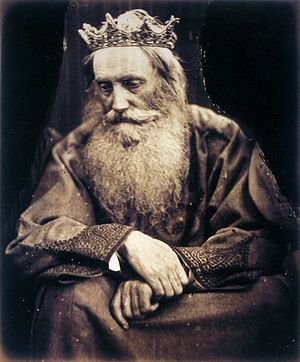 Image via Wikipedia
Image via WikipediaIn this disturbing family drama, there was no conversation or discussion or any attempt to bring any justice or resolution to Tamar's rape. Tamar was forced to live as a desolate woman in her brother's house as she watered her pain with tears. Tamar nursed her hurt of being violated and betrayed by both her step-brother and her father. King David betrayed his daughter when he didn't stand up for her. I wonder why didn’t David do something other than be furious? If David confronted Amnon with his guilt, urged him to acknowledge his guilt and then to seek forgiveness from Tamar, wouldn’t that have made for better family relations? Maybe, if guilt were properly ascribed, Tamar and Amnon could ultimately have been married. David’s fury did not resolve or assuage Tamar’s pain because she was still a violated woman, with no man championing her cause. Her brother Absalom counseled silence which prevented her from properly expressing her pain. The facade of normalcy was doomed to crack.
Tamar's brother Amnon continued to live in the palace, enjoying his life as the King's first-born son. His act was neither chastised nor addressed.
Since David had many wives, most of his children were half-brothers and half-sisters living in a large compound without really feeling as though they were part of a close-knit nuclear family. Ahinoam of Jezreel was the mother of Amnon, David’s firstborn son. Macaah, daughter of the King of Geshur, was the mother of David’s third son Absalom and of his daughter Tamar.
While Amnon professed to be in love with his sister Tamar, he didn’t understand that God wanted love to be expressed in marriage. Rather, Amnon pined for Tamar and acted on his uncle’s bad advice to get Tamar into his chambers deceitfully, yet with his father’s blessings. Amnon pretended to be ill and said that he wanted only Tamar to prepare bread for him and to feed him. When all of the servants were dismissed from his chambers, he grabbed Tamar. In spite of all her protests and her appeals to reason, he viciously raped her and then hated her. After raping her, Amnon had Tamar thrown out of his chambers, further humiliating her.
Tamar did not creep away silently. She left in a torn robe, weeping loudly with ashes on her head. She was a mess; no-one who saw her could possibly have misunderstood what had happened.
Her brother Absalom advised her to quietly live in his house. When King David heard about the rape, he was furious. Meanwhile, Absalom appeared to have cut off relations with Amnon.
Absalom's reticence, which implied equnimity, actually hid his growing, festering anger against his brother. After two years of smoldering anger, Absalom arranged for a party to which all of his siblings, including Amnon, were invited. After everyone was inebriated, Absalom had Amnon murdered.
I think that if this family had an open, honest conversation, Absalom wouldn’t have felt that the only way to avenge his sister was by murdering his brother. If silence were not the chokehold on their relationships,there could have been an open discussion in which hurts could have been aired and addressed. Perhaps, if Tamar saw any contrition in Amnon, she could have found a way to forgive her brother. If David acted as the spiritual leader of his family, he could have guided his children into a better way of dealing with the evil that was perpetrated. Maybe David could have effected some sort of punishment for Amnon that would have satisfied the other two siblings.
It is possible that David’s sin with Bathsheba made him feel that he was no longer qualified to make moral or judgment calls. Maybe he thought, “I’ve failed, so who am I to call Amnon to account.” Maybe he was afraid that his own sin would be thrown back at him. Nevertheless, the biggest failure here was each party forgot that the sin was primarily against God. Each person had to bring his hurts to God and pray that the pain would be resolved through God’s love for David and his family.
But as it was, each player receded to his corner nursing his wounds while planning revenge. No-one was consulting with God or seeking wisdom. Through this incident, Scripture shows us David, the man, the ineffectual father.


















